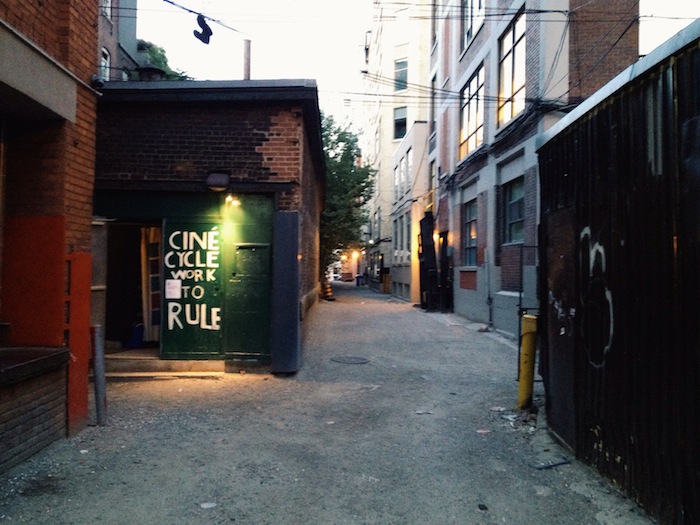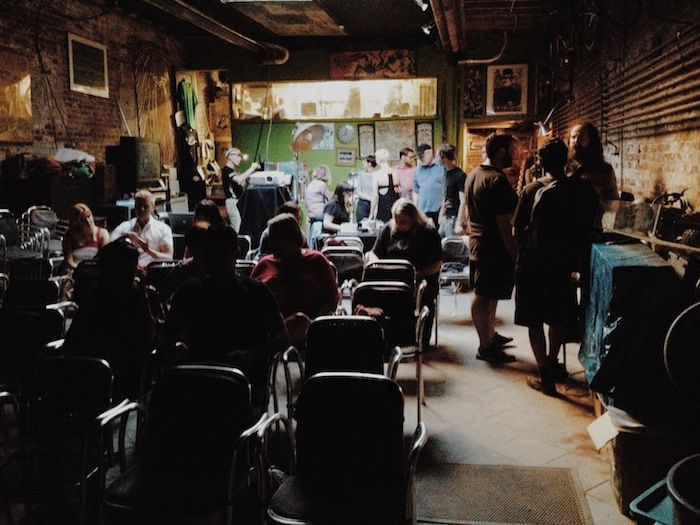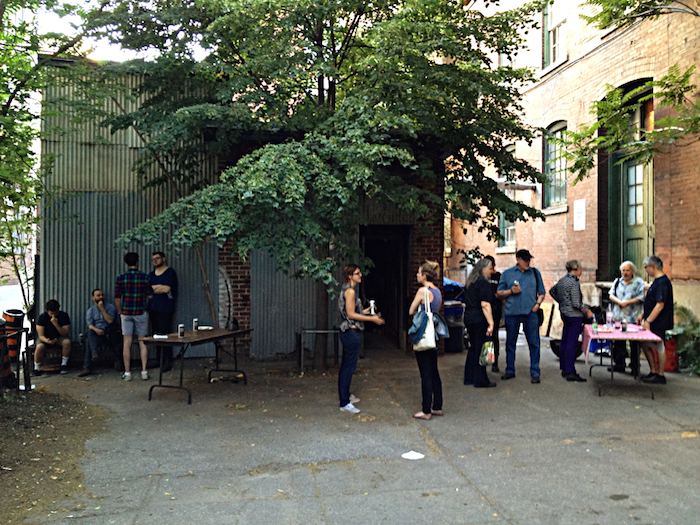
In a back lot down an alleyway off of Spadina, just south of Queen, about thirty people of widely varying ages, men and women, stand around talking. It’s a warm, bright Saturday evening.
“Okay, barbecue’s open,” an older man says, lifting the lid off a grill cooker. People cue up as Cannonball Adderley’s “So What” pipes through an iPod speaker system.
We’re at the rear of CineCycle, a bike repair shop by day and cinema by night. It’s one of the city’s most popular venues for underground film and video screenings, and on this particular night it’s hosting one of its regulars, the exhibition collective Pleasure Dome. It’s an Open Screening, meaning anyone with something to screen can sign up, and their work will be shown—pretty much an open mic, but with movies.
 The event has attracted an impressively diverse group of artists, programmers and cinephiles. It’s an artsy crowd, but they come from all walks of life, and while a fedora is spotted hovering above a thin moustache, most people are dressed in notably unpretentious fashion: monochromatic pants and shorts, floral summery dresses, plain T’s.
The event has attracted an impressively diverse group of artists, programmers and cinephiles. It’s an artsy crowd, but they come from all walks of life, and while a fedora is spotted hovering above a thin moustache, most people are dressed in notably unpretentious fashion: monochromatic pants and shorts, floral summery dresses, plain T’s.
As screening time approaches we head back into the old coach house that is home to CineCycle. Inside, the walls are exposed brick, with rusted piping running along them and art and bikes mounted above. A screen hangs at one end of the room, with folding chairs arrayed in front of it; at the other end, there are myriad technical devices for the projection of whatever’s going to be shown, and a makeshift bar serving cans of beer. A glass dome in the middle of the roof lets in some of the sunset, but it’s soon shuttered by means of a long wooden pole used to slide boards across the ceiling.
After the lights are dimmed, someone shouts, “Okay,” and a hush falls over the room. The first film begins: An old guy with white hair stands facing the audience impassively as his T-shirt, via stop-motion, rapidly cycles through a variety of styles and logos. Chuckles rise up from the audience, and after a couple of minutes the film concludes to applause. It’s followed by a wide variety of works from twenty more artists.
Experimental cinema is, by its nature, an underground and niche enterprise. It’s hard to say, by raw numbers, how it has grown in the city over the last couple of decades, because growth is not a metric of great concern in the community. What is clear, however, is that the scene’s place in Toronto’s overall culture has progressed substantially.
 Alternative cinema has been around for as long as mainstream cinema, but today’s community in the city seems very much rooted in the punk and DIY milieu of late-’80s Toronto. Pleasure Dome, in its current incarnation, at any rate—its predecessor, The Funnel Experimental Film Theatre, started in 1977—was established in 1989. The Images Festival, which has become North America’s dominant alternative moving image exhibition venue, was created in 1987.
Alternative cinema has been around for as long as mainstream cinema, but today’s community in the city seems very much rooted in the punk and DIY milieu of late-’80s Toronto. Pleasure Dome, in its current incarnation, at any rate—its predecessor, The Funnel Experimental Film Theatre, started in 1977—was established in 1989. The Images Festival, which has become North America’s dominant alternative moving image exhibition venue, was created in 1987.
“It was that era of cultural theory really exploding,” says Eli Horwatt, a programmer at both Pleasure Dome and the Toronto International Film Festival. “And I think the great thing about Pleasure Dome is that it always represented this kind of commitment to representing the margins, and representing marginalized cinemas.” It’s an attitude that still very much informs their ethos, he says. “I mean, we just had a two-part screening of experimental film in India that goes back to the sixties, and very few people know that exists.”
The founders of the Images Festival also saw their organization as both a vanguard for moving-image art, and a home for the marginalized. “From the beginning,” IF’s official history asserts, “Images has been at the forefront in identifying and supporting work that has been marginalized or unrecognized by existing exhibition venues, and was crucial in opening up dialogue in the media arts community around issues of race, culture, gender and sexuality.”
For the millennial generation, much of this might read as blandly appropriate—what people in the ’90s referred to as “politically correct”—but the social margins of race, sexuality, gender and class were hotly contested in the late 80s and early 90s, and while debates around those issues continue today, a lot of progress has been made in the intervening decades. It’s probably no coincidence that experimental film and video have moved closer to centre stage too—a movement clearly indicated in the rise of TIFF’s Wavelengths programme. Started in 2000, Wavelengths has grown from a small handful of shorts and features to a smattering of over forty works in last year’s festival.
 Eli Horwatt sees Wavelengths as a good barometer of the overall, international experimental community. “The role of Wavelengths,” he says, “is to represent this kind of erupting and constantly-changing landscape of artist-made film and video, of artist-made documentary, of formal work as well as political work.” Under the leadership of film curator Andréa Picard, Wavelengths “takes the temperature of this landscape,” and strives to “represent it well, in all its diversity, in all its beauty and ugliness, in all its shifting concerns.”
Eli Horwatt sees Wavelengths as a good barometer of the overall, international experimental community. “The role of Wavelengths,” he says, “is to represent this kind of erupting and constantly-changing landscape of artist-made film and video, of artist-made documentary, of formal work as well as political work.” Under the leadership of film curator Andréa Picard, Wavelengths “takes the temperature of this landscape,” and strives to “represent it well, in all its diversity, in all its beauty and ugliness, in all its shifting concerns.”
Given the diversity to be found in the experimental scene, both in terms of the work and the artists, is it possible that Toronto’s famously diverse social culture is particularly conducive to this kind of art? “Yeah, there is something about Toronto,” says Eli, who grew up in Los Angeles. “I think it’s the most diverse city in the world. But there’s also something about the conscience of the media arts community, historically, and trying to represent women, trying to represent queer artists, and trying to step out of the kind of white supremacy of old-guard experimental film.”
The community’s open-armed embrace of difference and plurality is perhaps its strongest suit in our current era of progressive social activism, and may account for its growing cultural prominence.
“A film scholar in Toronto named Mike Zryd has this great line—it’s that experimental film & video is one of the most anti-elitist forms of moving-image making,” Eli says. “A lot of people say, ‘The average person won’t respond to this work,’ but you can also flip that logic around. In some ways, the most elitist film is Transformers 4. It’s the one that cost 210 million dollars, it’s the one that is standing behind these nearly impenetrable institutions and these mega-infrastructures and these global capitalist monoliths.” Whereas the DIY roots of experimental cinema run deep, and the artistic process is refreshingly direct. “In the context of production and exhibition,” Eli says, “a person—who, by the way, is often not the typical white guy that directs Hollywood films—picks up a film or video camera and makes something. And they walk over to an artist-run centre that might distribute it, or they show it to a programmer or curator at a small micro-cinema and it might get screened. That’s the most anti-elitist thing ever.”
____
Alexander Perala is a contributor to Toronto Standard. Follow him on Twitter.
For more, follow us on Twitter and subscribe to our newsletter.











